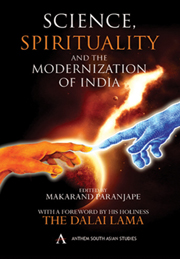Book contents
- Frontmatter
- Contents
- Notes on Contributors
- Foreword
- Editor's Preface
- I Science and Spirituality: East and West
- CHAPTER 1 Science, Spirituality and Modernity in India
- CHAPTER 2 Spiritual Pilgrimage: Indian and Western Perspectives; Spirituality, Logic and Science
- II Coming to Terms with Science: Some Change Agents
- III Building Bridges: Evolution, Consciousness and Healing
- IV Science and Spirituality: Culture, Society and Gender
CHAPTER 1 - Science, Spirituality and Modernity in India
from I - Science and Spirituality: East and West
Published online by Cambridge University Press: 05 March 2012
- Frontmatter
- Contents
- Notes on Contributors
- Foreword
- Editor's Preface
- I Science and Spirituality: East and West
- CHAPTER 1 Science, Spirituality and Modernity in India
- CHAPTER 2 Spiritual Pilgrimage: Indian and Western Perspectives; Spirituality, Logic and Science
- II Coming to Terms with Science: Some Change Agents
- III Building Bridges: Evolution, Consciousness and Healing
- IV Science and Spirituality: Culture, Society and Gender
Summary
Modern science was introduced to India under the shadow of colonialism. This means that neither was its progress in India simply a matter of European discovery and imperial dissemination, nor was there no ‘science’ in India prior to the British conquest of India. However, what is important to observe is that between modern science and traditional science, there was a marked disjunction as there was between traditional knowledge and ‘English education’. Because these gaps have still not been properly studied, let alone bridged, the history of modern science in India is inextricably linked with the history of colonialism as well. All the same, the trajectories of the two are neither coextensive nor conterminus. While colonialism rose, reached its peak, then declined and officially ended, modern science has enjoyed a steady and incremental rise since its inception. In fact, after independence its claims to an exalted social, political and cultural status have risen dramatically, especially with the heavy investment and continuous monitoring of the Nehruvian state in its growth and development. In his Introduction to Science, Hegemony and Violence: A Requiem for Modernity, Ashis Nandy called science ‘a reason of state’ and in Another Reason: Science and the Imagination of Modern India, Gyan Prakash labels the second part of his book ‘Science, Governmentality and the State’. Both authors regard science as very much a part of how the Indian state seeks to see or project itself, deriving legitimation and political advantage from it.
- Type
- Chapter
- Information
- Science, Spirituality and the Modernisation of India , pp. 3 - 14Publisher: Anthem PressPrint publication year: 2009



